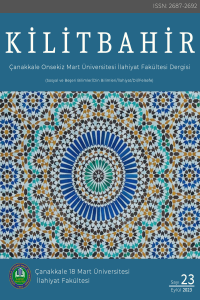Abstract
Bu makale, 20. Yüzyılda eser vermiş bir edebiyatçı ve felsefeci olarak Iris Murdoch’un Platon’un sanat felsefesine dair yorumunu merkeze almaktadır. Murdoch yazmış olduğu felsefî eserlerde ve çok sayıda romanda felsefî sorunları ele almış ve Platon ve Aristoteles’in ahlak felsefesine ve sanat felsefesine dair modern sorunları da merkeze alan bir bakış açısı geliştirmiştir. Her ne kadar Murdoch’un felsefî kimliği çok daha geniş bir yelpazede karşımıza çıkıyor olsa da, Bu makale özel olarak Murdoch’un Platon’un sanat felsefesine dair yazmış olduğu Ateş ve Güneş: Platon Sanatçıları Niçin Dışladı?” adlı eserini merkeze almaktadır. Makalenin yoğunlaşacağı sorular; Murdoch’un Platon yorumunun dayandığı temel kabullerin neler olduğu, Platon’un Murdoch’un kabul ettiği gibi bir püriten olup olmadığı sorularıdır. Makalenin giriş kısmında genel olarak Murdoch’un felsefî ve edebî kimliği hakkında bilgi verilmiş ve aynı zamanda Platon’un şiire ve sanata karşı olan genel tutumundan bahsedilmiştir. İkinci bölüm Murdoch’un Platon’u nasıl okuduğunu analiz etmektedir. Üçüncü ve son bölüm ise Platon bir püriten miydi sorusunun cevabını aramaktadır. Murdoch ‘Platon’un neden şairlere ve sanatçılara karşı olumsuz bir tutum aldığı’ sorusundan hareket ederek bunun temelde Platon’un sahip olduğu dinî bakış açısından ve onun bir püriten olmasından kaynaklandığını ifade eder. Bu makale Iris Murdoch’un Platon’un sanat felsefesine dair geliştirdiği yorumları ve Platon’a getirdiği eleştirileri analiz ederek, Murdoch’un Platon yorumuna, Platon’un bir püriten olup olmadığı sorusundan yola çıkarak bir eleştiri getirmeyi amaçlamaktadır.
Keywords
References
- Agard, Walter R. “Plato, Artist and Puritan”, The Classical Journal. 25/6 (1930), 435-444.
- Antonaccio, Mario. “Reconsidering Iris Murdoch’s Moral Philosophy and Theology”. Iris Murdoch: A Reassessment, ed. Anne Rowe. (New York: Palgrave Macmillan, 2007), 15-23.
- Beiser, Frederick. Hegel. çev. Seçim Beyazıt (İstanbul: Alfa Basım Yayım, 2019).
- Erkan, Mukadder. Iris Murdoch: Bir Ahlak Filozofu Olarak Sanatçının Portresi (Konya: Çizgi Yayınevi, 2011).
- Hegel. Tinin Görüngübilimi. çev. Aziz Yardımlı (İstanbul: İdea Yayınları, 1986).
- Martin, Priscilla. “The Preacher’s Tone: Murdoch’s Mentors and Moralists”, Iris Murdoch and Morality, ed. Anne Rowe ve Avril Horner (Birleşik Krallık: Palgrave Macmillan, 2010).
- Murdoch, Iris. Ağ. çev. Nihal Yeğinobalı (İstanbul: Ayrıntı Yayınları 2011).
- Murdoch, Iris. Ateş ve Güneş: Platon Sanatçıları Niçin Dışladı? (İstanbul: Ayrıntı Yayınları, 2021).
- Murdoch, Iris. İyinin Egemenliği. çev. Tuğba Gülal (İstanbul: Ayrıntı Yayınları, 2000).
- Murdoch, Iris. Kara Prens. çev. Aysun Babacan (İstanbul: Ayrıntı Yayınları, 1999).
- Murdoch, Iris. Melekler Zamanı. çev. Nihal Yeğinobalı (İstanbul: Ayrıntı Yayınları, 2005).
- Murdoch, Iris. Rüya Sakinleri. çev. Handan Akdemir (İstanbul: Ayrıntı Yayınları, 1999).
- Platon. Devlet. çev. Sabahattin Eyüboğlu- M. Ali Cimcöz (İstanbul: Türkiye İş Bankası Kültür Yayınları, 2007).
- Sikes, E. E. The Greek View of Poetry. London. 1931.
Abstract
This article focuses on Iris Murdoch's interpretation of Plato's philosophy of art as a literary and philosophical figure of the 20th century. In her philosophical works and numerous novels, Murdoch has addressed philosophical issues and developed a modern perspective on Plato's and Aristotle's moral philosophy and philosophy of art. Although Murdoch's philosophical identity is much broader, this article specifically focuses on Murdoch's writing on Plato's philosophy of art in Fire and Sun: Why Plato Excluded Artists. The questions that the article will focus on are; what are the basic assumptions on which Murdoch's interpretation of Plato is based and whether Plato was a puritan as Murdoch accepts. The introductory part of the article provides information about Murdoch's philosophical and literary identity in general and also discusses Plato's general attitude towards poetry and art. The second section analyzes how Murdoch reads Plato. The third and final chapter seeks to answer the question of whether Plato was a puritan. Starting from the question 'why Plato had a negative attitude towards poets and artists', Murdoch argues that this was mainly due to Plato's religious outlook and the fact that he was a puritan. By analyzing Iris Murdoch's interpretations of Plato's philosophy of art and her criticisms of Plato, this article aims to critique Murdoch's interpretation of Plato based on the question of whether Plato was a puritan.
Keywords
References
- Agard, Walter R. “Plato, Artist and Puritan”, The Classical Journal. 25/6 (1930), 435-444.
- Antonaccio, Mario. “Reconsidering Iris Murdoch’s Moral Philosophy and Theology”. Iris Murdoch: A Reassessment, ed. Anne Rowe. (New York: Palgrave Macmillan, 2007), 15-23.
- Beiser, Frederick. Hegel. çev. Seçim Beyazıt (İstanbul: Alfa Basım Yayım, 2019).
- Erkan, Mukadder. Iris Murdoch: Bir Ahlak Filozofu Olarak Sanatçının Portresi (Konya: Çizgi Yayınevi, 2011).
- Hegel. Tinin Görüngübilimi. çev. Aziz Yardımlı (İstanbul: İdea Yayınları, 1986).
- Martin, Priscilla. “The Preacher’s Tone: Murdoch’s Mentors and Moralists”, Iris Murdoch and Morality, ed. Anne Rowe ve Avril Horner (Birleşik Krallık: Palgrave Macmillan, 2010).
- Murdoch, Iris. Ağ. çev. Nihal Yeğinobalı (İstanbul: Ayrıntı Yayınları 2011).
- Murdoch, Iris. Ateş ve Güneş: Platon Sanatçıları Niçin Dışladı? (İstanbul: Ayrıntı Yayınları, 2021).
- Murdoch, Iris. İyinin Egemenliği. çev. Tuğba Gülal (İstanbul: Ayrıntı Yayınları, 2000).
- Murdoch, Iris. Kara Prens. çev. Aysun Babacan (İstanbul: Ayrıntı Yayınları, 1999).
- Murdoch, Iris. Melekler Zamanı. çev. Nihal Yeğinobalı (İstanbul: Ayrıntı Yayınları, 2005).
- Murdoch, Iris. Rüya Sakinleri. çev. Handan Akdemir (İstanbul: Ayrıntı Yayınları, 1999).
- Platon. Devlet. çev. Sabahattin Eyüboğlu- M. Ali Cimcöz (İstanbul: Türkiye İş Bankası Kültür Yayınları, 2007).
- Sikes, E. E. The Greek View of Poetry. London. 1931.
Details
| Primary Language | Turkish |
|---|---|
| Subjects | Sociology (Other) |
| Journal Section | Research Articles |
| Authors | |
| Publication Date | September 18, 2023 |
| Submission Date | July 14, 2023 |
| Published in Issue | Year 2023 Issue: 23 |
Our journal, which was published as Çanakkale Onsekiz Mart University Journal of Theology Faculty, changed its name to Kilitbahir as of August 1, 2019.
Creative Commons License
This work is licensed under a Creative Commons Attribution-NonCommercial 4.0 International License.


